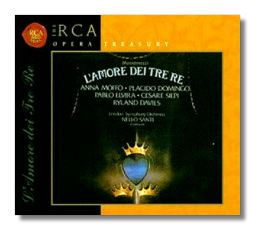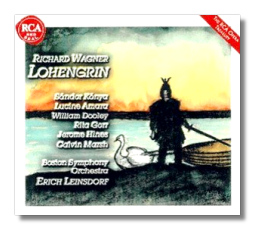
The Internet's Premier Classical Music Source
Related Links
- Latest Reviews
- More Reviews
-
By Composer
-
Collections
DVD & Blu-ray
Books
Concert Reviews
Articles/Interviews
Software
Audio
Search Amazon
Recommended Links
Site News
 CD Review
CD Review
Montemezzi / Wagner

Italo Montemezzi
L'amore dei tre re
- Anna Moffo (Fiora)
- Plácido Domingo (Avito)
- Pablo Elvira (Manfredo)
- Cesare Siepi (Archibaldo)
- Ryland Davies (Flaminio)
London Symphony Orchestra/Nello Santi
RCA Victor Red Seal 74321-50166-2 ADD 2CDs: 48:20, 49:21


Richard Wagner
Lohengrin
- Sándor Kónya (Lohengrin)
- Lucine Amara (Elsa)
- Rita Gorr (Ortrud)
- William Dooley (Friedrich)
- Jerome Hines (Heinrich)
- Calvin Marsh (Herald)
Boston Chorus Pro Musica/Alfred Nash Patterson
Boston Symphony Orchestra/Erich Leinsdorf
RCA Victor Red Seal 74321-50164-2 ADD 3 CDs: 74:37, 71:28, 70:13
First performed in 1913, The Love of the Three Kings (to use its English title) attracted the best singers and conductors in its day. Now it is largely forgotten, and I believe that this RCA recording, newly reissued, is the only one that the work has received in the stereo age.
One might expect it to be a verismo opera. Hints that it is not come from the plot. In Act II, the old, blind king Archibaldo strangles his young and vibrant daughter-in-law Fiora with his bare hands, and then slings her over his shoulder. She spends all of Act III dead onstage, bearing a pair of poisoned lips, which first her lover Avito and then her husband Manfredo kiss, with fatal results. Not very realistic! It has been said that the plot is allegorical; Fiora represents Italy, and her obligations are to her people, not to her conquerors. As for the music, it resembles the work of Richard Strauss far more than that of Puccini, Leoncavallo, or Mascagni. Its tortured chromaticism would not have been out of place in Die Frau ohne Schatten, and it would not take a lot of effort to convince most listeners that this was not the work of an Italian composer. The opera is relentlessly melodic, but not "tuneful." Its melodies do not instantly stick in one's head, and there are no set-pieces; the arias, as such, are seamlessly integrated into the opera as a whole. Come to think of it, I never have encountered an excerpt from L'amore dei tre re on a recital disc or in concert. The orchestration is savvy and opulent - again, more characteristic of Strauss, or maybe Respighi. Perhaps this is not a great opera, but the level of workmanship is high. Its lurid plot and opulent score recommend themselves.
RCA recorded this in 1976. At the time, Moffo's career was winding down, and so was Siepi's. They both sound a little frayed on top, but not distressingly so. (Siepi's character is supposed to be old anyway.) Moffo's voice largely retains it glamour, she's an accomplished vocal actress, and I like the screams and gurgles she makes as Siepi's character throttles her. Elvira is a fabulous baritone. I don't know what became of him, but he didn't seem to last very long on the international scene, and I know of only a few other recordings that he made. All around, he is the strongest of this recording's leads. Domingo, as one would expect at this stage of his career, sings beautifully, but apart from a generalized ardor, he's not extremely interesting in the role of the only king who is loved by Fiora. Santi conducts like an old pro, and the chorus, orchestra, and supporting cast are excellent. The recording is excellent too, although some of the climaxes get a little rough.
Opera seldom is recorded in the United States because it can be prohibitively expensive. Also, I suspect there is a subtle prejudice among American opera fans that homegrown product is not as good as European. When RCA taped its Lohengrin in 1965, little did they know that they were making what has been called the biggest money-losing classical recording of all time. I'm not sure exactly why this was the case, but it might have had to do with these factors. Also, budget-conscious buyers probably thought twice about laying out the cash for a five-LP set. As a result, that set commands a good price in the used LP market, and so it is considerate of RCA to have done this CD reissue.
Granted, I generally am no Wagnerian, but there was a lot for me to enjoy here. In the title role, Hungarian tenor Kónya makes a positive impression. His is a warm and Italianate Lohengrin - no cardboard cut-out - blending romantic passions, heroism, and spiritual mystery. "In fernem Land" is gorgeous, and, at the end, when he addresses his "lieber Schwan," his use of head tone is intoxicating and bewitching. As Elsa, Lucine Amara cuts a hypersensitive and vulnerable figure. Although her voice is neither large nor traditionally beautiful, she makes a virtue of her faults, and, in so doing, makes Elsa into an unusually human character. Dooley is a distinctive Friedrich, not content with just generic evil. The smaller parts are strongly done too. The most controversial piece of casting is Rita Gorr's Ortrud. At this point in her career, her voice was pretty much shot, but here, she throws it around with thrilling abandon. Some of the sounds that issue from her throat at the end of the opera are barely human; I was laughing so hard that I couldn't cover my ears. A case could be made, however, that it is not entirely inappropriate to have an Ortrud whose vocal delivery resembles that of a screech owl. This is a memorable performance.
The chorus is fabulous. They sing with precision, impressive sonority, and dramatic commitment. Another glory of this set is the Boston Symphony Orchestra, particularly its brass section. It's not for nothing that RCA used to advertise them as "the aristocrat of orchestras." Erich Leinsdorf was one of this century's greatest conductors, and Wagner was a special strength of his. Without sacrificing polish, he ensures that this recording has the drama of a stage performance. Finally, this also is an audiophile's Lohengrin. Richard Mohr and Anthony Salvatore, the original producer and engineer, created a wide stereo soundstage, and the deployment of voices and instruments across it results in sound of clarity and thrilling impact.
Overall, this is the best Lohengrin I know.
Copyright © 1999, Raymond Tuttle


















